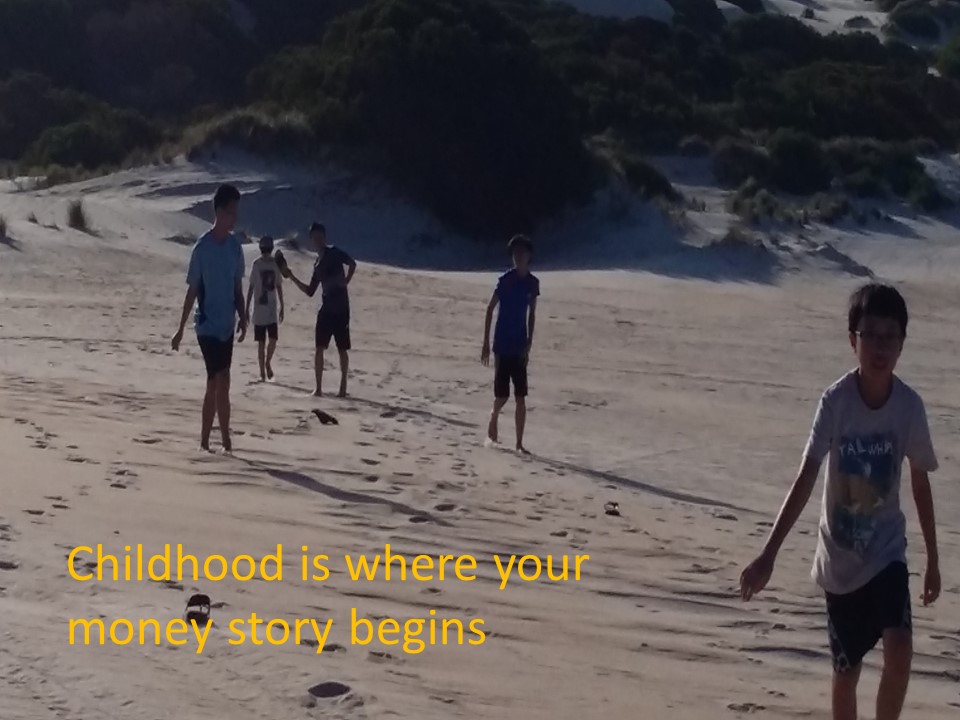
Childhood
is where your money story begins
What’s your money story?
Too often, when the money subject was being discussed, I heard many people would say:
You only live once. Enjoy it while you can
If I have X amount of money, I would be rich and I would be happier.
If I had more money, ____ wouldn’t be a problem.
Since I work hard, I deserve that new _____.
I can’t earn enough to get ahead.
They say money is not everything. I would say wait till you don’t have any, it is everything. To many of us, money can elicit a whole slew of feelings: shame, pride, guilt, stress, and more. These feelings about money stem from your childhood and as you were growing up. We learnt about money from our parents and other influences in life. And these feelings, and experiences combined to form our money story which made up of our money beliefs, and thoughts and it affects how we think and act with our money, and maybe even impact the advice we give about our client’s money.
Maybe your money story gave you all the tools and guidance you need to be successful with your finances. Or perhaps it gave you the negative limiting beliefs that have been stopping you from achieving financial success.
Your money story can affect your finances more than you think it does. So it’s important for you to look back at your childhood, the past experience, emotions, thoughts, and beliefs about money that drive your behavior today.
In my own life, I often heard:” We have no money for you to study. As a woman, you do not need to go to school” My parents argued about money and they were unhappy. So lack of money was the problem in my family. And I thought if my family had more money, the hardship and unhappiness would somehow disappear. So subconsciously in my adult life, I strive to accumulate more and more money, in order to avoid the same problem that occurred in my family. In fact, sometimes even when more money is coming in, I never feel like enough. This scarcity mindset about money has a profound impact and it has shaped my financial behavior- consciously and unconsciously!
To uncover it, you have to dig deep. You will need to answer some tough questions to develop your money story. No filters, no second-guessing yourself. Let go with your honest thoughts, feelings, experiences, and impressions about the issues.
So what did money represent in your family when you were growing up, and what were you taught about its uses?
- What was your earliest memory about money?
- Do thoughts of money bring up feelings of worry, guilt, anger, sadness, power, love, or joy?
- What emotions did your family associate with money? Did your parents fight about money? Use the money to control you or one another?
- Did your family experience a significant financial event when you were a child? A job loss, divorce, substantial debt, windfall, etc.
- When you were young, did you feel like you had more, less, or the same money as your friends? Did you make comparisons?
- What was the feeling around spending money and paying bills when you were growing up?
- Do you feel grateful for the money you have earned or acquired?
- How do you decide how or when to spend it?
- Do you feel like financial success is attainable? Why or why not?
- Do you give a portion of your earnings back to your church/temple/mosque or your community?
Now write one paragraph…” My relationship with money is…….”
The answers to these questions can set you on the path to understand your money story that formed early in your life as well as help you, as a financial professional to move forward with some new awareness.
You may find it uncomfortable doing such deep self-reflection on your own financial situation and find it awkward to get help from outside advice around your own money challenges. In fact, self-reflection/introspection/self-discovery is a very good way to discover our own relationship with money. We understand better about our own money challenges and what we need to change to improve the situation. By going through the self-discovery process ourselves, it provides us a good perspective that we can develop a deeper sense of empathy and a good understanding of our clients on what they may be feeling and what may be holding them back in the financial planning process.
Once you know your money story, you can take a good, hard look at how it affects your money mindset and finances today.
- Is it holding you back?
- If so, how?
- And how can you move forward with this information?
If the past money story doesn’t benefit you, you can determine if you need to create a new money mindset. Get clear and conscious of your thoughts and your feelings. You can forgive yourself, create a new vision, and build new habits to support your unique money story. Then take action to make small but incremental changes till your new financial pictures emerge. You may find a coach or a trusted friend to talk to about what is holding you back.
Since most of us are in the “helping” professions, it’s worthwhile to take the time to explore our own money story, and again, creating a great self-awareness is a great way to develop greater empathy for the clients and their experiences.
So what’s your money story?
What have you discovered?
What actions have you taken so far?
I would like to hear from you below in the comments. Was this article helpful?





